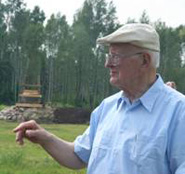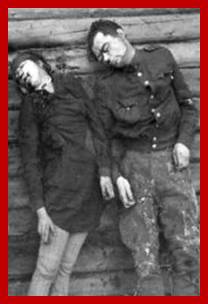
THE VOICE OF INTERNATIONAL LITHUANIA
|
VilNews has its own Google archive! Type a word in the above search box to find any article.
You can also follow us on Facebook. We have two different pages. Click to open and join.
|
Archive for 2011
- Posted by - (0) Comment
Donatas Januta: Reply to Didier Bertin re Holocaust in Lithuania
Didier Bertin forgot to blame Lithuania for global warming

Donatas Januta
Didier Bertin forgot a fewthings in his list. Global warming, the Greek financial crisis, and the price of fish in Denmark, are just a few of the things that come to mind, for which he could equally blame Lithuania. But let’s look at what he included in his list.
- Bookmark :
- Digg
- del.icio.us
- Stumbleupon
- Redit it
- Posted by - (2) Comment
Donatas Januta: Reply to Didier Bertin re Holocaust in Lithuania
Didier Bertin forgot to blame Lithuania for global warming

Donatas Januta
Didier Bertin forgot a few things in his list. Global warming, the Greek financial crisis, and the price of fish in Denmark, are just a few of the things that come to mind, for which he could equally blame Lithuania. But let’s look at what he included in his list.
He first objects to the fact that Lithuania desires to question, not to persecute or prosecute, but merely to question, witnesses to admitted criminal acts, and has in some cases asked Interpol for assistance. What are these criminal acts? Here is testimony of some of those Jewish partisan bandits, about the indiscriminate murdering of civilian villagers, whose only crime was occasionally defending their homes from robberies:
Abraham Zeleznikow: “Partisans came around the village, everything was torched, every animal, every person was killed.”
Paul (Pol) Bagriansky: “In a small clearing in the forest six bodies of women of various ages and two bodies of men were lying around in a half circle. All bodies were undressed and lying on their backs. One man at a time was shooting in between the legs of the dead bodies. When the bullet would strike the nerve, the body would react as if it were alive. It would shiver, quiver for a few seconds. All men of the unit were participating in this cruel play, laughing, in a wild frenzy.”
Abraham Zeleznikow: "And one of my friends, acquaintances, a partisan, took a woman, put her head on a stone, and killed her with a stone."
Zalman Wylozni: “the entire village of 80 farmsteads was burned to the ground and its inhabitants were murdered.”
Contrary to Bertin’s false statement, Lithuania is seeking to question these witnesses not because they are Holocaust survivors, nor because they were simply members of Soviet .partizan groups, but because they were witnesses or participants in criminal acts. While Israel searches the world over for the last geriatric former prison guard, Lithuania, according to Bertin, is not entitled even to ask questions of persons who have admitted to having witnessed criminal acts or been members of groups which committed criminal acts.
As far as Lithuania not outlawing the Swastika and not forbidding neo-Nazis or others with whose views Bertin or even myself might not agree, all that is permitted and protected by the constitution in the USA as well, as pointed out by Evan Zimroth, professor of Jewish Studies at the City University of New York. But Bertin would have Lithuania grant freedom of speech and freedom of expression only to those who agree with his views. I assume that Bertin is not displeased with statutes in Israel and other countries, including in Lithuania, which prohibit Holocaust denial, but he condemns Lithuania because it also prohibits denying Lithuania’s painful 50 year occupation by the Soviets. Of course, Bertin is not the only one in the world who is seeking to impose a double standard here.
Bertin refers to the non-renewal of Dovid Katz’s contract at Vilnius’ University and speculates that it was so done because Katz did not agree with the opinion of the government. But Bertin does not know the reason for the non-renewal. Dovid Katz’s previous employment with the Yiddish Institute at Oxford was also terminated, and at that time Mr. Katz claimed that he was a victim of anti-semitism. But that was not true. Eventually Mr. Katz withdrew that claim of anti-semitism, and indicated that he knew it was an untrue claim even when he made it. See Dan Cohn-Sherbook’s article of January 16, 1998. And previous to that, Dovid Katz’s employment with Oxford Centre for Hebrew and Jewish Studies was not uneventful either. See the Dec. 21, 1994, article in The Guardian about his suspension from that institution for financial irregularities.
So we really don’t know the reason for Dovid Katz’s leaving Vilnius’ University. For example, Mr. Katz taught and lived in Lithuania at a Lithuanian University for 11 years, but never acquired any sort of competence in the Lithuanian language. That might have been a factor as well. In fact, it is ironic that Mr. Katz has for some time now presented himself as a knowledgable expert on present-day Lithuania and Lithuanians. He has even postulated a theory, with suitable academic jargon, that the “common people” of Lithuania are good, but it is the “elite” who are the problem because they are the ones who do not agree with Mr. Katz’s opinions regarding the German and Soviet atrocities in Lithuania during World War II.
But how can Mr. Katz possibly have any insight into Lithuanians, be they “common” or “elite”, when he does not know their language? When I met with him in Vilnius, he freely admitted that he does not speak Lithuanian. So, he could not read Lithuanian newspapers to see what they were saying. He could not watch and understand Lithuanian television. He could not mingle with Lithuanians, whatever their social class. He could not even understand what persons on the street, or in Lithuania’s sidewalk cafes or bars or restaurants were saying. Mr. Katz spent 11 years in Lithuania in a self-imposed cocoon, isolated from the people among whom he lived. Under such circumstances, it seems that Mr. Katz probably knows as much about present-day Lithuania and Lithuanians, as the average Lithuanian peasant knows about the tribal culture of the Watusis in Africa.
There are other points where Mr. Bertin is totally off the mark, but I have covered most of those other issues in my previous postings in this series, and I will leave for another time the defense of Lithuania with respect to such matters as global warming and the Greek financial crisis. But, I do have one more question.
According to The Holocaust Education Trust of Britain, out of 168,000 Jews in Lithuania, 140,000 or 83% were killed, and in Poland 2,900,000 Jews, or 88% of Poland’s Jews were killed. Other sources, e.g., “Atlas of the Holocaust” show similar relative figures. According to Israeli historian Dina Porat, 99.5% of Lithuanians were neither directly nor indirectly involved in the German organized killing of Jews. So why is Lithuania being repeatedly demonized by Efraim Zuroff, now also by Dovid Katz, and their followers, while Poland is being given a relatively free pass? Are the lives of the 2,900,000 killed Polish Jews worth less than the 140,000 killed in Lithuania? Or is it simply that Poland being ten times the size and population of Lithuania has ten times as many resources – financial, political, and media access - with which to respond to false and exaggerated accusations, while the small country of Lithuania is an easier target because it has fewer resources with which to defend itself?
- Bookmark :
- Digg
- del.icio.us
- Stumbleupon
- Redit it
- Posted by - (0) Comment
Advent 1945:
|
IN THE WORLD
“Across America, people crowd churches praying with gratitude for the peace in place, and reach out to wounded veterans, children who lost fathers, and neighbors who lost sons. Americans in big cities and small, participate in displays of the intrinsic love so indicative of the American spirit.” |
IN LITHUANIA
In 1944-45 Lithuanians were forced to realize that the bloody World War II had been replaced by a new war, the longest and bloodiest guerrilla war in modern European history, lasting from 1944 to at least 1953. |
Advent and Christmas of 1945 was over most of the world celebrated with a joy and delight almost never before seen. Young and old gathered in homes, on streets and in churches. An endless series of victory ceremonies took place in almost every corner of the world. With a deep sense of joy and gratitude all wanted each other warm, comfortable and relaxing Christmas holidays, knowing that the Nazi era was over and that the world now more than ever could look forward to a future of peace and prosperity. The war had finally released the grip, forgotten was the economic recession of the 1930s. Forgotten was also our Western World’s close friends and neighbours - the Baltic States.
On a small farm in northern Lithuania, in the outskirts of the village Šilagalis, Christmas 1945 is nearing. It is the 22nd of December, and the mother of the house feels very happy that her 21 year old son Povilas has finally come home to visit after having been away for many months.
- Bookmark :
- Digg
- del.icio.us
- Stumbleupon
- Redit it
- Posted by - (0) Comment
Advent with Pavarotti
Schubert: Mille Cherubini in Coro
- Bookmark :
- Digg
- del.icio.us
- Stumbleupon
- Redit it

Kerry Shawn Keys
kerrykeys@yahoo.com
Kerry Shawn Keys’ roots are in the Appalachian Mountains (eastern North America). From 1998 to 2000, he taught translation theory and creative composition as a Fulbright Associate Professor at Vilnius University. He has dozens of books to his credit, including translations from Portuguese and Lithuanian, and his own poems informed by rural America and Europe, and Brazil and India (Peace Corps) where he lived for considerable time. His work ranges from theatre-dance pieces to flamenco songs to meditations on the Tao Te Ching, and is often lyrical with intense ontological concerns. Of late, he has been writing prose wonderscripts, and monologues for the stage. A children’s book, The Land of People, received a Lithuanian laureate in 2008 for artwork he co-authored. He performs with the free jazz percussionist and sound-constellation artist, Vladimir Tarasov – Prior Records released their CD in 2006. His most recent book is Transporting, a cloak of rhapsodies (2010).
- Bookmark :
- Digg
- del.icio.us
- Stumbleupon
- Redit it

Kerry Shawn Keys
kerrykeys@yahoo.com
Kerry Shawn Keys’ roots are in the Appalachian Mountains (eastern North America). From 1998 to 2000, he taught translation theory and creative composition as a Fulbright Associate Professor at Vilnius University. He has dozens of books to his credit, including translations from Portuguese and Lithuanian, and his own poems informed by rural America and Europe, and Brazil and India (Peace Corps) where he lived for considerable time. His work ranges from theatre-dance pieces to flamenco songs to meditations on the Tao Te Ching, and is often lyrical with intense ontological concerns. Of late, he has been writing prose wonderscripts, and monologues for the stage. A children’s book, The Land of People, received a Lithuanian laureate in 2008 for artwork he co-authored. He performs with the free jazz percussionist and sound-constellation artist, Vladimir Tarasov – Prior Records released their CD in 2006. His most recent book is Transporting, a cloak of rhapsodies (2010). Keys received the Robert H. Winner Memorial Award from the Poetry Society of America in 1992, and in 2005 a National Endowment For The Arts Literature Fellowship. He received a Translation Laureate Award from the Lithuanian Writers Union in 2003. He was a Senior Fulbright Research grantee for African-Brazilian studies, and is a member of the Lithuanian Writers Union and PEN. Selected poems have appeared in Czech, English, and Lithuanian. Currently, Keys is Poet-in-Residence for Summer Literary Seminars Lithuania (SLS Lithuania). He also writes a bi-monthly column, Letter From Vilnius: Eastern/Central Europe and Excursions Elsewhere for Poetry International, San Diego State University.
from the Dais
in memory of Cicero
this is my tongue
this is my left hand
I wasn’t much for speaking
my syllables weren’t pebbles
I was a poet
made to sing
nonetheless
They impaled these here
my body’s vestigial and elsewhere
my right hand’s an organ donation of a kind
I’m trying to say as much as I can
(it’s difficult) before my tongue gets eaten
by the tiniest of birds and the silence of the sun
soon all that remains
will be the sign language of bone
around the imagined palm
and what has been
and will be
written
The Gorge
Grapes feed the gorge,
unforaged wine of the sun’s forge,
and wormy apples, dandelion and feed corn.
And all that grows near or in the gorge,
or pours down from overhead to deluge
the coal-mine Franz Klein darkness,
also feeds the shipwrecked Minotaur
that lies in wait there.
It eats nearly everything
that tumbles and tosses
into the main of its inarticulate throat.
This is what a gorge does best,
turning all that’s green and crimson
into powdery carapace
and the muddy mask of compost.
It will eat you, too, like the papier-mâché pâté
of imprisoned gutturals that spill from your pen.
You won’t get away as the gorgeous, gray heron
I saw one day rising in a pterodactyl-deadly
Icarian arabesque
back into the breath of its own creation.
Disgorged and godlike, and glad to fall victim
to the ferocious rays of the sun.
Sugar
Sugar. Ice-cream...look at all these old people. At the round-table. I want to go. I never thought I’d end up in one of these. Home. O’! cake. Sugar. I don’t want that. Greens, no. Ha, can I take the dessert to my room. Goody. For later. If you don’t finish your meal you can’t...doesn’t mean I can’t. Not my last time, or first. God, how sweet. Sweets. How many years. Chocolate, boy, you always liked chocolate. Goody. God. Death should be fed. Me. And I don’t...when i fell, they gave me sugar. In my blood. Night night sweetheart your nana said. Her last words. Heart. Corason. Kore. Karen. You are still allergic to apples. Sweetheart, take care, the ice-cream will melt. I’ll drink it. A shake. Do you know, sweet, I’ve lost my mind. My memory’s gone. Sure, I remember her name. Her names. Ann. Joy. It’s snowing. Look. Gone. Who’s gone. Me. Him. It’s so hot, snowing, in here. Ice-cream. The window, open. I never thought I would have a picture-window. All those sleigh scenes on the dinner plates. Remember. I remember you. What’s your name. I’m just kidding. It’s cold. But I can look out the window. See the snow. And you can look in. A real picture-window. Pictures on both sides. My hair, I didn’t comb. I want some ice-cream, a cone, a snow-cone. So sweet. I didn’t think I’d live this long. The pain is gone. Remember, I used to wish I was dead. So much pain. Here, have some. Where are you. It’s time for bed. You can stay here. They changed the sheets. It’s so cold. With the window open, are there still pictures on both sides. Sugar sheets. Sweet. Pillows. See my bears. When I fell, it was at the pictures. I remember that. I was leaving. I never left though. I’m here. It’s cold. Sleeping on sugar. Remember the sugar-plum fairy. And the tooth-fairy. You’ve always had a sweet-tooth, too. Did you see the pictures. Both sides. None from below. You can sleep under the bed. Or the pillow with the tooth-fairy. No one will see you. Like snow on TV. There must be a picture from above. The man upstairs. That’s what your father used to say, the man upstairs. Sweet, tuck me in. One more year, and then another. It’s snowing. The ice-cream truck. Can you hear the bells.
Dog
The little bastard was yapping and biting at my pant legs. I took the plastic bag of pampers I was carrying to the dumpster and whacked him over the head. But then I lost my balance and fell on the icy sidewalk into a coma. When I came to, I had the smelly pampers all over and around me. A spiteful dog. He must have torn into the bag and decorated me with them. There he was, under a nearby tree still yapping at me. I picked up a pamper and threw it at him. Then another and another and another and another and another and another and another…finally keeping one for myself as protection. This was the first battle. War was looming. I went back to my flat to develop a strategy. I put the stinking pamper on the table next to my compass and pen and paper. Opening the window for some fresh air, I saw the dog sniffing the pampers. He was wagging his tail as if gloating. Getting my smell I guess. He too was making plans. I would fool him and change my diet – no more dairy products! I put the pamper in the freezer as a souvenir of the first skirmish. A matter of life and death. Purple hearts. For the moment, neither of us had triumphed.
- Bookmark :
- Digg
- del.icio.us
- Stumbleupon
- Redit it
- Posted by - (0) Comment
Bloomberg
Lithuania may have to raise the level of public debt to repay depositors of Bankas Snoras

DnB economist Jekaterina Rojaka:
Lithuania may need 1 billion euros ($1.33 billion) next year to make up for funds used to clean up after the collapse of Snoras, Lithuania’s fifth-largest bank by assets.
Lithuania may have to raise the level of public debt to repay depositors of Bankas Snoras AB, exacerbating an increase in financing costs caused by Europe’s sovereign-debt crisis.
The Baltic nation may need 1 billion euros ($1.33 billion) next year to make up for funds used to clean up after the collapse of Snoras, Lithuania’s fifth-largest bank by assets, said DnB Bank AB economist Jekaterina Rojaka. State debt may surge to 40 percent of economic output from 33.3 percent at the end of October at an “unfavorable time” as the crisis roils financial markets, she said.
“The pressure in the near-term is very strong because the government will be left with no reserves to refinance maturing debt,” Rojaka said. “The first half isn’t looking very cheerful for Lithuania.”
Lithuania, which experienced the world’s second-deepest recession in 2009 after Latvia, aims to cut the budget deficit to 2.8 percent of gross domestic product next year from 9.5 percent in 2009 as it looks to switch to the euro in 2014.
Read more: http://www.businessweek.com/news/2011-12-01/lithuania-borrowing-costs-to-surge-as-snoras-payments-boost-debt.html
- Bookmark :
- Digg
- del.icio.us
- Stumbleupon
- Redit it
VilNews e-magazine is published in Vilnius, Lithuania. Editor-in-Chief: Mr. Aage Myhre. Inquires to the editors: editor@VilNews.com.
Code of Ethics: See Section 2 – about VilNews. VilNews is not responsible for content on external links/web pages.
HOW TO ADVERTISE IN VILNEWS.
All content is copyrighted © 2011. UAB ‘VilNews’.

 Click on the buttons to open and read each of VilNews' 18 sub-sections
Click on the buttons to open and read each of VilNews' 18 sub-sections 





















.jpg)



